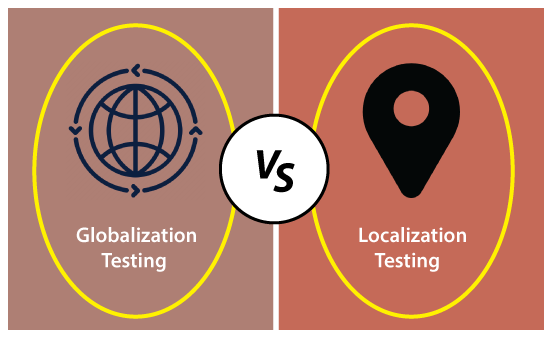In this section, we are going to understand the major differences between globalization testing and localization testing.
Globalization testing and Localization testing are a widely used type of software testing by many small and large enterprises.
What is Globalization testing?
It is another type of software testing used to test the software developed for multiple languages, is called globalization testing, and improving the application or software for various languages is known as globalization.
Globalization testing ensures that the application will support multiple languages and multiple features because, in current scenarios, we can see the enhancement in several technologies as the applications are planned to be used globally.
What is Localization testing?
It is nothing but a format of software testing. We test the particular application based on the country, region, etc. As we know, the Localized product only supports the precise kind of languages that are usable only in a specific region.
It is also known as L10N testing, and here 10 is the number between L and N in the Localization word.
Globalization Testing vs. Localization Testing
Let us see some of the essential differences between Globalization Testing and Localization Testing.

|
S.NO |
Globalization Testing |
Localization Testing |
|
1. |
Globalization
testing is performed to make sure that the software application supports
various languages along with multiple features. |
The localization
testing is performed to verify that the software application supports a
precise kind of language which can be used only in a specific region. |
|
2. |
In a globalized
product, a code is separated from the messages or information. By using
globalization testing, we can enable the software to be used with different
languages without redesigning the complete software. |
The localized
product is not required in localization testing. |
|
3. |
It mainly emphasizes
users as the generic user base. |
It mainly emphasizes
a small group of users in a given culture or locale. |
|
4. |
The globalization
testing will help us identify the potential issues and bugs in the software,
preventing its expected performance. |
The localization
testing will help us to detect typographical errors. |
|
5. |
It verifies all the
functionality of the software product with the help of all the possible
international inputs. |
The localization
testing will help us to verify all application resources. |
|
6. |
While executing the
globalization testing, the test engineer assumes that the software product is
being tested and used across the world. |
While executing the
localization testing, the test engineer assumes that the software product is
being tested and going to be used by a certain group of users in a particular
locality. |
|
7. |
The globalization
testing validates the different currency formats such as an address, mobile
number formats are maintained by the software application. |
The localization
testing validates that the particular address format, currency format, and
mobile number format are working fine or not. |
|
8. |
It helps to separate
the test engineer from translators and engineers and ensure a detailed and
independent approach. |
It helps to diminish
the time for testing; subsequently, it's done just on locale. |
|
9. |
Globalization
testing takes comparatively time to implement the tests. |
Localization testing
will take less time to implement tests. |
|
10. |
In globalization
testing, we have formalized bug reporting. |
The localization
testing helps us to decreases overall testing and support costs. |
|
11. |
For
example, www.google.com
supports many languages, and people from different countries can access it;
therefore, it is a globalized product. |
For
example, QQ.com supports
only the Chinese language, which can be accessed only by a few countries. |
Conclusion
The globalization testing and localization testing will help the testing team takes required procedures to enhance the performance, quality, functionality, and other significant fundamentals of the software product.
Lastly, we can say that if we do not perform globalization testing and localization testing techniques, the software engineers cannot develop a good quality software product, which meets the necessities of the end-user and market.



0 Comments